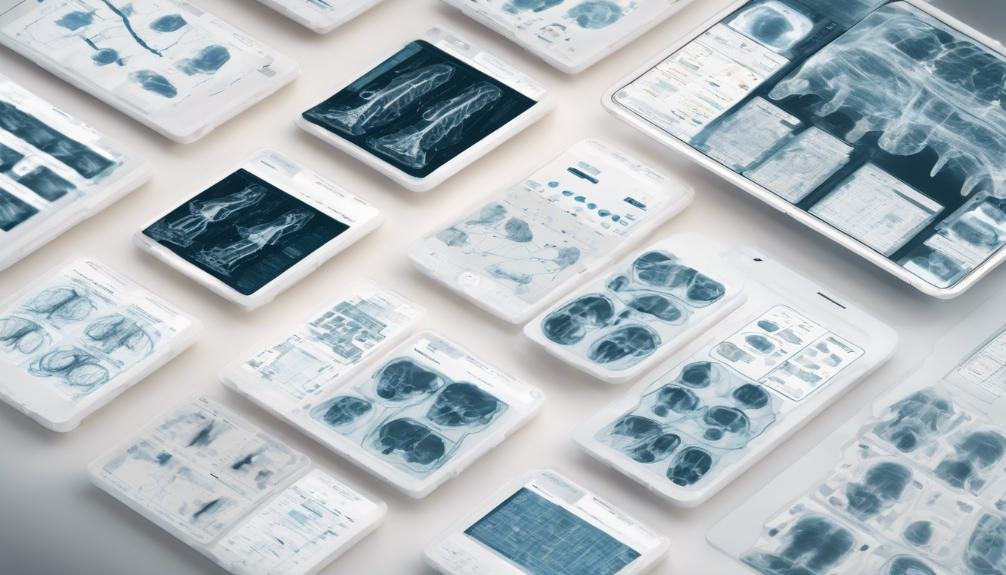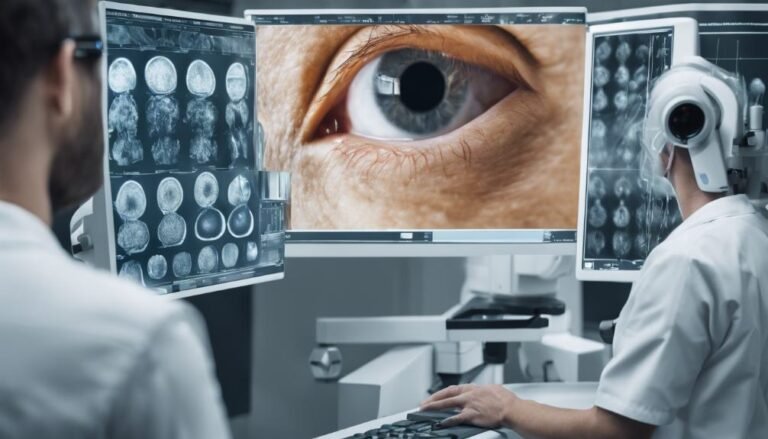AI for Health Data Standardization
When it comes to health data standardization, AI emerges as a game-changer. Imagine the possibilities when advanced algorithms seamlessly unify diverse data sets, ensuring accuracy and consistency. But that's just the beginning. The real intrigue lies in how AI's adaptive nature tackles evolving data standards, optimizing organization for unparalleled efficiency. Stay tuned to discover how AI's prowess in standardization revolutionizes healthcare data management and shapes the future of patient care.
Key Takeaways
- AI automates mapping disparate health data sources for standardization.
- Advanced algorithms ensure consistent data structures.
- Technology enhances efficiency and accuracy in data harmonization.
- AI-driven standardization process improves decision-making in healthcare.
- AI offers significant advantages in streamlining data formats.
Importance of Standardized Health Data
Standardized health data plays an essential role in ensuring accuracy and interoperability within healthcare systems. Data accuracy is paramount in providing quality care, making standardized formats pivotal for consistency across different platforms. By adhering to uniform data structures, healthcare providers can trust the information received, leading to better decision-making processes and improved patient outcomes.
Moreover, data privacy is a significant concern in the healthcare sector. Standardization helps maintain confidentiality by establishing clear protocols for handling sensitive information. Consistent data formats enable better encryption methods and access controls, reducing the risk of unauthorized breaches.
Patients can feel more secure knowing that their data is being handled in a standardized, secure manner.
Role of AI in Data Harmonization
You'll explore the benefits that AI brings to data harmonization, focusing on its ability to streamline the integration of disparate health data sources.
AI plays an important role in facilitating the harmonization process by leveraging advanced algorithms to standardize and unify diverse datasets.
Through an AI-driven standardization process, you'll witness how technology enhances efficiency and accuracy in handling complex health data for improved decision-making in healthcare settings.
AI Benefits in Harmonization
Utilizing artificial intelligence (AI) offers significant advantages in the process of data harmonization by streamlining and automating the standardization of diverse health datasets. AI plays a vital role in enhancing data normalization techniques, guaranteeing that data from various sources are transformed into a uniform format. Through AI-driven patient outcomes, healthcare professionals can derive meaningful insights from standardized data, leading to more informed decision-making and improved patient care.
Moreover, AI contributes to enhancing health data quality by employing advanced data cleaning techniques. By automatically identifying and rectifying inconsistencies, errors, and missing values in datasets, AI algorithms streamline the data cleaning process, saving time and reducing the risk of human errors.
This meticulous approach to data cleaning ensures that the harmonized datasets are accurate and reliable, laying a solid foundation for further analysis and research in the healthcare domain.
Data Integration With AI
AI plays a pivotal role in facilitating the integration of diverse health datasets through its advanced data harmonization capabilities. AI data integration involves leveraging machine learning algorithms to align and combine data from various sources, ensuring seamless interoperability.
By utilizing predictive analytics, AI can identify patterns and relationships within the integrated datasets, providing valuable insights for healthcare decision-making.
Machine learning algorithms play an essential role in the data integration process by automatically recognizing similarities and variances in the datasets, enabling the harmonization of disparate data formats and structures. These algorithms help in standardizing terminology, formats, and values across different datasets, ensuring data quality assurance and consistency.
Through AI-driven data integration, healthcare organizations can streamline processes, improve efficiency, and enhance the accuracy of analyses. By harmonizing heterogeneous health data using AI technologies, organizations can tap into the full potential of their data assets, leading to more informed decision-making and improved patient outcomes.
AI-driven Standardization Process
Frequently, machine learning algorithms are employed to drive the standardization process in data harmonization, ensuring seamless integration of diverse health datasets. AI plays an essential role in enhancing data quality by automating the identification and resolution of inconsistencies across varied sources. Through advanced algorithms, AI can detect anomalies, standardize formats, and reconcile discrepancies, ultimately improving the overall coherence and reliability of health data.
Machine learning algorithms contribute greatly to addressing challenges related to data quality by enabling the automatic normalization of data elements, such as patient demographics, lab results, and medical histories. By leveraging AI-driven standardization processes, organizations can streamline data harmonization efforts, reduce manual errors, and enhance the interoperability of health information systems.
Additionally, AI facilitates the identification of duplicate records, data gaps, and inaccuracies, leading to more accurate and detailed datasets for analysis and decision-making in healthcare settings. To summarize, the role of AI in data harmonization through machine learning algorithms is paramount in ensuring standardized, high-quality health data integration.
Benefits of Interoperability in Healthcare
Enhancing healthcare interoperability leads to streamlined communication and improved coordination among healthcare providers. Data interoperability benefits include the ability to seamlessly exchange patient information across different systems and facilities. This allows for a more thorough view of the patient's medical history, leading to better-informed decision-making and ultimately improving patient outcomes.
Health information exchange benefits from interoperability by reducing duplicate tests and procedures, minimizing errors, and enhancing patient safety. When healthcare systems can effectively share data, it results in a more efficient and cost-effective delivery of care. Additionally, interoperability promotes continuity of care as patients move between different healthcare settings.
Interoperability also plays an essential role in public health initiatives, enabling real-time data sharing for disease surveillance, outbreak management, and research. By breaking down data silos and promoting seamless information exchange, interoperability in healthcare lays the foundation for a more connected and collaborative healthcare ecosystem.
Enhancing Data Exchange Efficiency
To enhance data exchange efficiency in healthcare, focus on AI data mapping and streamlining data formats. Utilizing artificial intelligence can automate the process of mapping different data sources to a common standard, reducing manual errors and inconsistencies.
Streamlining data formats guarantees seamless interoperability and improves the overall efficiency of health data exchange systems.
AI Data Mapping
You can optimize data exchange efficiency by utilizing AI data mapping techniques. Data transformation and AI algorithms play an essential role in enhancing the interoperability of health data systems.
Machine learning, a subset of AI, enables automated data mapping processes by recognizing patterns and relationships within datasets. By utilizing advanced data mapping techniques, such as semantic mapping and probabilistic record linkage, AI can accurately match and align disparate data formats, structures, and vocabularies.
AI algorithms can adapt to evolving data standards and mappings, ensuring that healthcare organizations can efficiently exchange critical information while maintaining data integrity. Through the application of supervised and unsupervised learning methods, AI-driven data mapping tools can streamline the process of harmonizing data from multiple sources.
These techniques enable healthcare providers to overcome interoperability challenges and facilitate seamless data exchange between systems, ultimately improving the quality of care delivery and decision-making processes in the healthcare industry.
Streamlining Data Formats
Efficient data exchange in healthcare can be greatly enhanced by streamlining data formats through advanced AI techniques. Data transformation plays an important role in simplifying processes by converting data from one format to another, ensuring compatibility and seamless communication between different systems.
By employing AI algorithms, data optimization becomes achievable, allowing for the efficient organization and structuring of healthcare information. Streamlining operations through the standardization of data formats not only improves interoperability but also enhances data integrity and accuracy.
Through the utilization of AI for health data standardization, the complex task of converting and transferring data is simplified, leading to a more streamlined and effective exchange of information. By automating the process of data transformation, healthcare organizations can reduce errors, save time, and enhance overall data quality.
This optimization of data formats enables healthcare providers to access relevant information quickly, improving decision-making and ultimately enhancing patient care. To sum up, streamlining data formats using AI technologies is an essential step towards achieving a more efficient and interoperable healthcare system.
Improving Patient Care With AI
AI algorithms have shown promise in enhancing patient care by providing valuable insights for healthcare providers.
In the field of AI diagnostics, these algorithms analyze vast amounts of patient data to assist doctors in accurately diagnosing conditions. By utilizing machine learning and deep learning techniques, AI can identify patterns in medical images, such as X-rays and MRIs, aiding in the early detection of diseases like cancer.
Additionally, AI plays an essential role in patient monitoring, continuously analyzing real-time data from wearable devices or medical sensors to alert healthcare professionals of any concerning changes in a patient's health. This proactive monitoring can lead to timely interventions, improving patient outcomes and reducing the risk of complications.
Challenges in Health Data Standardization
Amidst the advancements in healthcare technology, the challenge of standardizing health data persists. Data governance challenges pose significant obstacles in guaranteeing that health data is consistent, accurate, and accessible across different systems and platforms. These challenges include issues related to data quality, interoperability, and security.
One of the primary challenges in health data standardization is maintaining regulatory compliance. Healthcare organizations must adhere to a myriad of regulations such as HIPAA, GDPR, and other country-specific laws to safeguard the privacy and security of patient information. Meeting these regulatory requirements while standardizing health data can be complex and resource-intensive.
Moreover, data governance challenges such as data silos, inconsistent data formats, and lack of standardized terminology further complicate the standardization process. These barriers hinder the seamless exchange of health information between healthcare providers, researchers, and other stakeholders.
Addressing these challenges is essential for unleashing the full potential of health data for improving patient care and driving innovation in healthcare.
AI Solutions for Data Quality
You can enhance data quality in health information systems through AI data cleaning techniques. By employing automated data normalization processes, you can standardize and structure health data efficiently.
These AI solutions offer a systematic approach to ensuring the accuracy and consistency of health data, ultimately improving decision-making processes in healthcare.
AI Data Cleaning Techniques
When addressing data quality issues in health data, utilizing advanced AI data cleaning techniques is essential for ensuring accuracy and reliability in the standardized data sets. Data cleansing techniques powered by machine learning algorithms play a vital role in detecting and correcting errors, inconsistencies, and missing values within the health data. Machine learning models can automatically identify outliers and anomalies, flagging them for further investigation or correction.
Natural language processing (NLP) is another key component in AI data cleaning. NLP algorithms can parse through unstructured text data in health records, extracting relevant information and standardizing formats. This process aids in ensuring that the data is uniform and consistent, improving overall data quality.
Additionally, data validation techniques are employed to verify the accuracy and integrity of the health data. Through automated validation processes, AI systems can cross-reference data points, check for duplicates, and validate entries against predefined rules, enhancing the overall quality and reliability of the standardized health data.
Automated Data Normalization
Automated data normalization through AI solutions is an essential component in maintaining data quality standards within healthcare systems. Data normalization techniques play an indispensable role in ensuring that healthcare data is consistent, accurate, and reliable for analysis and decision-making processes.
By leveraging AI automation, healthcare organizations can streamline their data normalization processes, reducing errors and inconsistencies that may arise from disparate data sources. AI algorithms can analyze and standardize various data formats, units of measurement, and terminology, ensuring that information is uniformly structured and comparable across different datasets.
Through automated data normalization, healthcare professionals can access clean, standardized data that's essential for improving clinical outcomes, optimizing resource allocation, and enhancing overall operational efficiency within healthcare systems.
Future Trends in Data Management
Implementing advanced machine learning algorithms is poised to revolutionize future trends in health data management. Data governance and data security will be key focuses in the upcoming developments.
Future data management systems will need to guarantee strict adherence to data governance policies to maintain data integrity and compliance. Machine learning models will play an essential role in automating data governance processes, such as monitoring data quality and ensuring regulatory requirements are met.
Enhanced data security measures will be integrated into data management systems to protect sensitive health information from cyber threats. Advanced encryption techniques and anomaly detection algorithms will strengthen security protocols, safeguarding patient data from unauthorized access or breaches.
As the volume of health data continues to grow exponentially, scalable data management solutions will be essential to handle the influx of information efficiently.
Impact of AI on Healthcare Systems
AI is revolutionizing healthcare systems by enhancing diagnostic accuracy and optimizing treatment plans through data-driven insights. AI diagnostics play a vital role in this transformation by analyzing vast amounts of medical data to identify patterns and predict patient outcomes with remarkable precision. By leveraging sophisticated algorithms, AI can detect subtle abnormalities in medical images, leading to earlier and more accurate diagnoses of conditions such as cancer or cardiovascular diseases.
Healthcare analytics powered by AI enable providers to make informed decisions based on real-time data, improving operational efficiency and patient care. Through predictive analytics, healthcare organizations can forecast patient volumes, optimize resource allocation, and even prevent potential medical emergencies by identifying high-risk individuals. This proactive approach enhances overall patient outcomes while reducing healthcare costs.
Implementing AI for Better Outcomes
Utilizing AI in healthcare systems greatly enhances patient outcomes by leveraging data-driven insights for more precise diagnoses and treatment plans. Implementing AI for better outcomes involves strategic AI implementation strategies and overcoming data standardization challenges.
AI integration in healthcare holds the potential to markedly improve healthcare outcomes through advanced data analysis and decision-making processes.
AI implementation strategies in healthcare encompass the development of robust data collection methods, effective data processing algorithms, and the integration of AI technologies into existing healthcare systems. By streamlining these strategies, healthcare providers can harness the full potential of AI to optimize patient care and treatment outcomes.
However, the implementation of AI in healthcare isn't without challenges. Data standardization poses a significant hurdle in ensuring seamless AI data integration across various healthcare platforms.
Overcoming these challenges requires the establishment of standardized data formats, interoperable systems, and data governance frameworks to enable effective AI utilization for improved healthcare outcomes.
Through strategic planning and technological advancements, AI data integration benefits can be maximized to enhance patient care and drive better healthcare results.
Conclusion
To sum up, AI applications in health data standardization offer a promising pathway to precision and productivity in healthcare. By leveraging advanced algorithms and machine learning, AI optimizes data organization, enhances interoperability, and improves patient care outcomes.
The seamless synergy between AI and data management guarantees streamlined processes for better decision-making and data exchange efficiency. Embrace the evolving landscape of AI in healthcare for enhanced outcomes and operational excellence.







